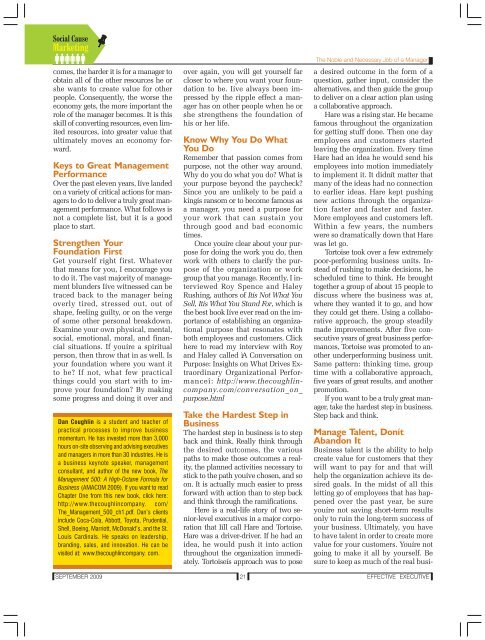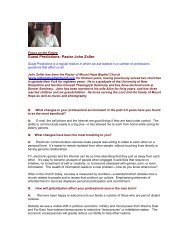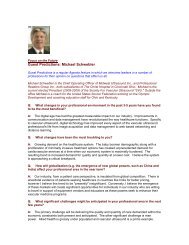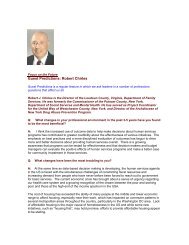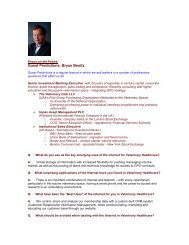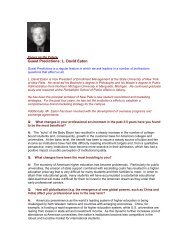Social Cause Marketing - The Regis Group Inc
Social Cause Marketing - The Regis Group Inc
Social Cause Marketing - The Regis Group Inc
Create successful ePaper yourself
Turn your PDF publications into a flip-book with our unique Google optimized e-Paper software.
comes, the harder it is for a manager to<br />
obtain all of the other resources he or<br />
she wants to create value for other<br />
people. Consequently, the worse the<br />
economy gets, the more important the<br />
role of the manager becomes. It is this<br />
skill of converting resources, even limited<br />
resources, into greater value that<br />
ultimately moves an economy forward.<br />
Keys to Great Management<br />
Performance<br />
Over the past eleven years, Iíve landed<br />
on a variety of critical actions for managers<br />
to do to deliver a truly great management<br />
performance. What follows is<br />
not a complete list, but it is a good<br />
place to start.<br />
Strengthen Your<br />
Foundation First<br />
Get yourself right first. Whatever<br />
that means for you, I encourage you<br />
to do it. <strong>The</strong> vast majority of management<br />
blunders Iíve witnessed can be<br />
traced back to the manager being<br />
overly tired, stressed out, out of<br />
shape, feeling guilty, or on the verge<br />
of some other personal breakdown.<br />
Examine your own physical, mental,<br />
social, emotional, moral, and financial<br />
situations. If youíre a spiritual<br />
person, then throw that in as well. Is<br />
your foundation where you want it<br />
to be? If not, what few practical<br />
things could you start with to improve<br />
your foundation? By making<br />
some progress and doing it over and<br />
Dan Coughlin is a student and teacher of<br />
practical processes to improve business<br />
momentum. He has invested more than 3,000<br />
hours on-site observing and advising executives<br />
and managers in more than 30 industries. He is<br />
a business keynote speaker, management<br />
consultant, and author of the new book, <strong>The</strong><br />
Management 500: A High-Octane Formula for<br />
Business (AMACOM 2009). If you want to read<br />
Chapter One from this new book, click here:<br />
http://www.thecoughlincompany. com/<br />
<strong>The</strong>_Management_500_ch1.pdf. Dan’s clients<br />
include Coca-Cola, Abbott, Toyota, Prudential,<br />
Shell, Boeing, Marriott, McDonald’s, and the St.<br />
Louis Cardinals. He speaks on leadership,<br />
branding, sales, and innovation. He can be<br />
visited at: www.thecoughlincompany. com.<br />
SEPTEMBER 2009<br />
over again, you will get yourself far<br />
closer to where you want your foundation<br />
to be. Iíve always been impressed<br />
by the ripple effect a manager<br />
has on other people when he or<br />
she strengthens the foundation of<br />
his or her life.<br />
Know Why You Do What<br />
You Do<br />
Remember that passion comes from<br />
purpose, not the other way around.<br />
Why do you do what you do? What is<br />
your purpose beyond the paycheck?<br />
Since you are unlikely to be paid a<br />
kingís ransom or to become famous as<br />
a manager, you need a purpose for<br />
your work that can sustain you<br />
through good and bad economic<br />
times.<br />
Once youíre clear about your purpose<br />
for doing the work you do, then<br />
work with others to clarify the purpose<br />
of the organization or work<br />
group that you manage. Recently, I interviewed<br />
Roy Spence and Haley<br />
Rushing, authors of Itís Not What You<br />
Sell, Itís What You Stand For, which is<br />
the best book Iíve ever read on the importance<br />
of establishing an organizational<br />
purpose that resonates with<br />
both employees and customers. Click<br />
here to read my interview with Roy<br />
and Haley called ìA Conversation on<br />
Purpose: Insights on What Drives Extraordinary<br />
Organizational Performanceî:<br />
http://www.thecoughlincompany.com/conversation_on_<br />
purpose.html<br />
Take the Hardest Step in<br />
Business<br />
<strong>The</strong> hardest step in business is to step<br />
back and think. Really think through<br />
the desired outcomes, the various<br />
paths to make those outcomes a reality,<br />
the planned activities necessary to<br />
stick to the path youíve chosen, and so<br />
on. It is actually much easier to press<br />
forward with action than to step back<br />
and think through the ramifications.<br />
Here is a real-life story of two senior-level<br />
executives in a major corporation<br />
that Iíll call Hare and Tortoise.<br />
Hare was a driver-driver. If he had an<br />
idea, he would push it into action<br />
throughout the organization immediately.<br />
Tortoiseís approach was to pose<br />
21<br />
<strong>The</strong> Noble and Necessary Job of a Manager<br />
a desired outcome in the form of a<br />
question, gather input, consider the<br />
alternatives, and then guide the group<br />
to deliver on a clear action plan using<br />
a collaborative approach.<br />
Hare was a rising star. He became<br />
famous throughout the organization<br />
for getting stuff done. <strong>The</strong>n one day<br />
employees and customers started<br />
leaving the organization. Every time<br />
Hare had an idea he would send his<br />
employees into motion immediately<br />
to implement it. It didnít matter that<br />
many of the ideas had no connection<br />
to earlier ideas. Hare kept pushing<br />
new actions through the organization<br />
faster and faster and faster.<br />
More employees and customers left.<br />
Within a few years, the numbers<br />
were so dramatically down that Hare<br />
was let go.<br />
Tortoise took over a few extremely<br />
poor-performing business units. Instead<br />
of rushing to make decisions, he<br />
scheduled time to think. He brought<br />
together a group of about 15 people to<br />
discuss where the business was at,<br />
where they wanted it to go, and how<br />
they could get there. Using a collaborative<br />
approach, the group steadily<br />
made improvements. After five consecutive<br />
years of great business performances,<br />
Tortoise was promoted to another<br />
underperforming business unit.<br />
Same pattern: thinking time, group<br />
time with a collaborative approach,<br />
five years of great results, and another<br />
promotion.<br />
If you want to be a truly great manager,<br />
take the hardest step in business.<br />
Step back and think.<br />
Manage Talent, Donít<br />
Abandon It<br />
Business talent is the ability to help<br />
create value for customers that they<br />
will want to pay for and that will<br />
help the organization achieve its desired<br />
goals. In the midst of all this<br />
letting go of employees that has happened<br />
over the past year, be sure<br />
youíre not saving short-term results<br />
only to ruin the long-term success of<br />
your business. Ultimately, you have<br />
to have talent in order to create more<br />
value for your customers. Youíre not<br />
going to make it all by yourself. Be<br />
sure to keep as much of the real busi-<br />
EFFECTIVE EXECUTIVE


